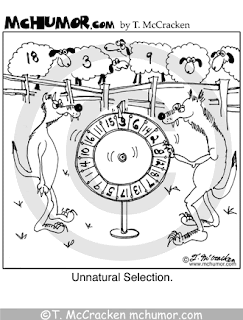 |
| Grizzly bear in Yellowstone National Park. Credit: Oregon State Univ. |
Which is why I'm still puzzled that so many of my hunter friends do not understand that the removal of large, native predators such as wolves, cougars and bear (add Northern pikeminnow to the fish list) has a negative consequence on the ecosystem they inhabit. Repeatedly, peer-reviewed, scientific studies have shown this. Moreover, a recent, comprehensive study from Oregon State University's Dr. Bill Ripple confirmed this in Northern Hemisphere forested ecosystems - loss of predators is affecting ecosystem health.
 |
| by Oregon cartoonist T. McCracken |
And yet, many of my hunter friends still bang the gong for State-supported predator removal programs like those in Idaho, Montana and Alaska. Why do the States support them, you ask? Because the hunters demand them. Why do hunters demand them? As far as I can tell, it's because they want larger animals and more of the game they seek. Sure, I like "the hunt" and bagging the big bull elk, buck deer or long-bearded tom turkey. But I'm not in it for trophies. I'm in it for hormone- and antibiotic- free meat to feed my family - and how more "natural" of meat can you get?! But I don't like seeing all the hunter-wounded animals out there, the unnaturally large elk herds artificially supported by alfalfa fields or costly winter feeding programs and the thick herds of deer with hair loss syndrome or chronic wasting disease problems. Numerous studies have found top-level mammalian predators target wounded, aged or infirm individuals, sometimes with little appreciable change in populations size (see a nice review study from 2001; the old adage of "It all depends" holds here, too). Sure, it often takes time to find that equilibrium (or at least a semi-fluctuating state with variations around a baseline). But left to its own devices, nature does find that 'sweet spot'.
 |
| Discussion from my Twitter feed... |
Well said Jeremiah - We have been having this same conversation among the Orion-the Hunters' Institute board and on our Fair Chase blog. Among informed and thoughtful hunters the large predator issue seems to boil down to allocation of prey. Conservationist/hunters disagree on how much the wolves, bear, lion and coyotes get vs us.
ReplyDeleteMy experience as a game warden in Vermont is hunting is a pretty crude tool for population control in the short term, but works pretty well over time. Predators are much finer tuned and more sensitive to prey population fluctuation. It is also true they take what they can get easiest, they also exploit weather events and anything else that gives them an edge in getting more calories than calories expended in getting the food.
Leopold said it well,"...the deer lives in mortal fear of the wolf, but the mountain lives in mortal fear of the deer."
Thank you for clueing me in to the Orion-the Hunters' Institute blog, Fair Chase. I'm now reading it. And thank you for your comment, Eric. Glad to know that other hunters and conservationists are having similar conversations. It's one that I've wrestled with many times, especially as I made my way through the academic realms. And I've read several papers on both sides of the fence. Much of the research seems to indicate a cyclic nature to the predator-prey relationship (as we'd expect) but limited impact from predators when populations are overly large - as many ungulate populations now are (and that makes biological sense, too). It seems that predators typically have a noticeable impact on prey populations when the prey populations are suppressed. Sadly, the Little Red Riding Hood stories have been enormously effective for centuries, creating a mindset that's been difficult to overcome with logic.
ReplyDeleteBy the way, I love the Leopold quote. I'd forgotten about that one but have added it to my rotating list if email signature quotes. Thanks! :)
Val Geist, professor at U of Calgary, poses that prey need predators to keep them from becoming domesticated. They will lose their ability to survive in the wild without this pressure.
ReplyDeleteI suspect part of the problem with our elk herds is the fact that they have been without wolves for 50-100 years and have started on the domestication path. Now the wolves have easy pickings...